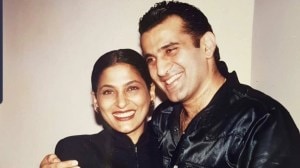AFTER HOURS
Our correspondent dons the chowkidar8217;s hat to know how the men who let us sleep in peace do their 8216;challenging8217; work

Draped in a blanket and wielding a lathi, a chowkidar stays awake all night.8221; That was how a 10-year-old me defined the role of a security guard at an essay-writing competition. Many years later last week, I realized that the flesh-and-blood chowkidar is an antithesis of that simplistic definition. Okay, not exactly an antithesis, but his profile is loads beyond wearing a mantle, brandishing a cane and aping an owl. Like my one-night stint as a guard at the Monar Girls Hostel in Pune proved.
It was easy to spot BS Poori, the hostel chowkidar from a distance. He fitted my childhood description of his ilk 8212; draped in a blanket, holding a stick and briskly patrolling the area. But that was where the similarity ended. 8220;It8217;s 11:15 pm. The shift begins at 11. A chowkidar can8217;t afford to be late. Someone8217;s safety is at stake,8221; came the blow. Lesson no.1: Punctuality is sacrosanct in this job. Tough, I muttered to myself.
Poori handed me a blanket even though the breeze was moderately cool. I guessed that, like punctuality, this too was an obligatory tradition. As if he could read my surprise at his offer, he infused logic into it. 8220;Will protect you from mosquitoes,8221; he smiled. Well, Mr Puri, your pacification has only added to my fears, I thought. Are mosquitoes going to croon all night long, I grumbled in my head.
As he handed me his lathi, Poori said, 8220;Thump it every 10 minutes so the girls knows the watchman is taking care of them.8221; And I used to think security guards are lucky enough to sleep while working!nbsp;Producing a thump on the concrete floor with the four-foot-long cane lathi tipped with metal blunts appeared easy to do. Except that Poori wanted me to try so before I could kick-start my duty. I banged it on the floor. A feeble thump escaped in the atmosphere. Unable to hide his I-know-what-you-don8217;t grin, Poori said, 8220;See how I do it.8221; Adjusting his wrist in the small loop of a thick rope attached to the lathi, he banged it on the floor. The sound wasn8217;t loud but clearly audible in the dreary silence of the night. I guess the loop did the trick. It didn8217;t leave Poori enough room to move his wrist and that8217;s how it gave him a stronger grip on the lathi.
Wrapped in the blanket and with a monkey cap stretched across my face, I appeared an alien to myself, let alone two dogs on the street who were barking madly at me. Too afraid to shoo the creatures who8217;d wag their tales whenever I8217;d walk the road in my usual attire, Inbsp;cast frantic glances at Poori, who shooed them with his lathi. nbsp;
He checked his watch and said, 8220;12:30. From now on, the guard has to blow the whistle hourly till 3. Two other guards will take over after our shift ends at 2.8221; With this, he handed me the whistle and the torch. Like a typical novice, I jumped at even nadir-decibel sounds emanating from every possible source8212;from an insect8217;s buzz to the screech of brakes. 8220;Don8217;t get yourself tired by being too alert. Some sounds are a given. They are an inseparable part of the night and the environment,8221; he said. I laughed within at my rawness and let my nerves relax. My duty was coming to a close. Checking his watch, Poori signaled me to blow the whistle. Breaking the silence of the night was an uncomfortable idea but I had to do my duty. 8220;Blow it for three seconds at least,8221; Poori shouted. Without the earmuffs which I missed so desperately, I strived to perform my duty. And so I blew a screeching sound and broke the silence of the night.
- 01
- 02
- 03
- 04
- 05































